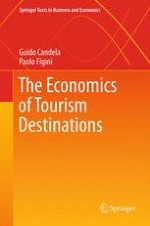2012 | OriginalPaper | Chapter
6. A Close Examination of the Consumer Theory Applied to the Tourist
Authors : Guido Candela, Paolo Figini
Published in: The Economics of Tourism Destinations
Publisher: Springer Berlin Heidelberg
Activate our intelligent search to find suitable subject content or patents.
Select sections of text to find matching patents with Artificial Intelligence. powered by
Select sections of text to find additional relevant content using AI-assisted search. powered by
